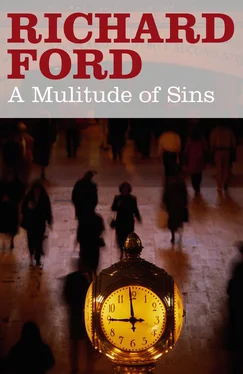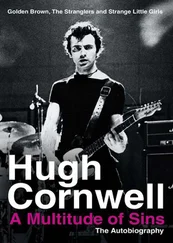“I do realize that. I certainly do,” Tom said, as if these words had more impact than she could feel.
Nancy shook her head and faced the tree-lined street, on the right side of which a new colonial-looking two-story brick hospital addition was under construction. New parking lot. New oncology wing. A helipad. Jobs all around. Beyond the hospital was a modern, many-windowed school named for Margaret Chase Smith, where the teams, the sign indicated, were called the solons. Someone, to be amusing, had substituted “colons” in dripping blood-red paint. “There’s a nice new school named for Margaret Chase Smith,” Nancy said, to change the subject away from periods of readjustment and a general failure of candor. “She was one of my early heroes. She made a brave speech against McCarthyism and championed civic engagement and conscience. Unfortunately she was a Republican.”
Tom spoke no more. He disliked arguing more than he hated being caught bullshitting. It was a rare quality. She admired him for it. Only, possibly now he was becoming a bullshitter. How had that happened?
They arrived at the inconspicuous middle of Belfast, where the brick streets sloped past handsome elderly red-brick commercial edifices. Most of the business fronts had not been modernized; some were shut, though the diagonal parking places were all taken. A small harbor with a town dock and a few dainty sailboats on their low-tide moorings lay at the bottom of the hill. A town in transition. From what to what, she wasn’t sure.
“I’d like to eat something,” Tom said stiffly, steering toward the water.
A chowder house, she already knew, would appear at the bottom of the street, offering pleasant but not spectacular water views through shuttered screens, terrible food served with white plastic ware, and paper placemats depicting a lighthouse or a puffin. To know this was the literacy of one’s very own culture. “Please don’t stay mad,” she said wearily. “I just had a moment. I’m sorry.”
“I was trying to say the right things,” he said irritably.
“I know you were,” she said. She considered reaching for the steering wheel and taking his hand. But they were almost to the front of the restaurant she’d predicted — green beaver-board with screens and a big red-and-white MAINELY CHOWDAH sign facing the Penobscot, which was so picturesque and clear and pristine as to be painful.
They ate lunch at a long, smudged, oilcloth picnic table overlooking little Belfast harbor. They each chose lobster stew. Nancy had a beer to make herself feel better. Warm, fishy ocean breezes shifted through the screens and blew their paper mats and napkins off the table. Few people were eating. Most of the place — which was like a large screened porch — had its tables and green plastic chairs stacked, and a hand-lettered sign by the register said that in a week the whole place would close for the winter.
Tom maintained a moodiness after their car-argument, and only reluctantly came around to mentioning that Belfast was one of the last “undiscovered” towns up the coast. In Camden, and farther east toward Bar Harbor, the rich already had everything bought up. Any property that sold did so within families, using law firms in Philadelphia and Boston. Realtors were never part of it. He mentioned the Rockefellers, the Harrimans and the Fisks. Here in Belfast, though, he said, development had been held back by certain environmental problems — a poultry factory that had corrupted the bay for decades so that the expensive sailing set hadn’t come around. Once, he said, the now-attractive harbor had been polluted with chicken feathers. It all seemed improbable. Tom looked out through the dusty screen at a bare waterside park across the sloping street from the chowder house. An asphalt basketball court had been built, and a couple of chubby white kids were shooting two-hand jumpers and dribbling a ball clumsily. There was a new jungle gym at the far end where no one was playing.
“Over there,” Tom said, his plastic spoon between his thumb and index finger, pointing at the empty grassy park that looked like something large had been present there once. “That’s where the chicken plant was — smack against the harbor. The state shut it down finally.” Tom furrowed his thick brow as if the events were grave.
An asphalt walking path circled the grassy sward. A man in a silver wheelchair was just entering the track from a van parked up the hill. He began patiently pushing himself around the track while a little girl began frolicking on the infield grass, and a young woman — no doubt her mother— stood watching beside the van.
“How do you know about all that?” Nancy said, watching the man foisting his wheelchair forward.
“A guy, Mick, at the co-op’s from Bangor. He told me. He said now was the moment to snap up property here. In six months it’ll be too pricey. It’s sort of a last outpost.”
For some reason the wheelchair rider she was watching seemed like a young man, though even at a distance he was clearly large and bulky. He was arming himself along in no particular hurry, just making the circle under his own power. She assumed the little girl and the woman were his family, making up something to do in the empty, unpretty park while he took his exercise. They were no doubt tourists, too.
“Does that seem awful to you? Things getting expensive?” She breathed in the strong fish aroma off the little harbor’s muddy recesses. The sun had moved so she put her hand up to shield her face. “You’re not against progress, are you?”
“I like the idea of transition,” Tom said confidently. “It creates a sense of possibility.”
“I’m sure that’s how the Rockefellers and the Fisks felt,” she said, realizing this was argumentative, and wishing not to be. “Buy low, sell high, leave a beautiful corpse. That’s not the way that goes, is it?” She smiled, she hoped, infectiously.
“Why don’t we take a walk?” Tom pushed his plastic chowder bowl away from in front of him the way a policeman would who was used to eating in greasy spoons. When they were college kids, he hadn’t eaten that way. Years ago, he’d possessed lovely table manners, eaten unhurriedly and enjoyed everything. It had been his Irish mother’s influence. Now he was itchy, interested elsewhere, and his mother was dead. Though this habit was as much his nature as the other. It wasn’t that he didn’t seem like himself. He did.
“A walk would be good,” she said, happy to leave, taking a long last look at the harbor and the park with the man in the wheelchair slowly making his journey around. “Trips are made in search of things, right?” She looked for Tom, who was already off to the cashier’s, his back going away from her. “Right,” she said, answering her own question and coming along.
They walked the early-September afternoon streets of Belfast — up the brick-paved hill from the chowder house, through the tidy business section past a hardware, a closed movie theater, a credit union, a bank, a biker bar, a pair of older realtors, several lawyers’ offices and a one-chair barbershop, its window cluttered with high-school pictures of young-boy clients from years gone by. A slender young man with a ponytail and his hippie girlfriend were moving large cardboard boxes from a beater panel truck into one of the glass storefronts. Something new was happening there. Next door a shoe-store space had been turned into an organic bakery whose sign was a big loaf of bread that looked real. An art gallery was beside it. It wasn’t an unpleasant-feeling town, waiting quietly for what would soon surely arrive. She could see why Tom would like it.
From up the town hill, more of the harbor was visible below, as was the mouth of another estuary that trickled along an embankment of deep green woods into the Penobscot. A high, thirties-vintage steel bridge crossed the river the way the bridge had in Wiscasset, though everything was smaller here, less up-and-going, less scenic — the great bay blue and wide and inert, just another park, sterile, fishless, ready for profitable alternative uses. It was, Nancy felt, the way all things became. The presence of an awful-smelling factory or a poisonous tannery or a cement factory could almost seem like something to wish for, remember fondly. Tom was not thinking that way.
Читать дальше












